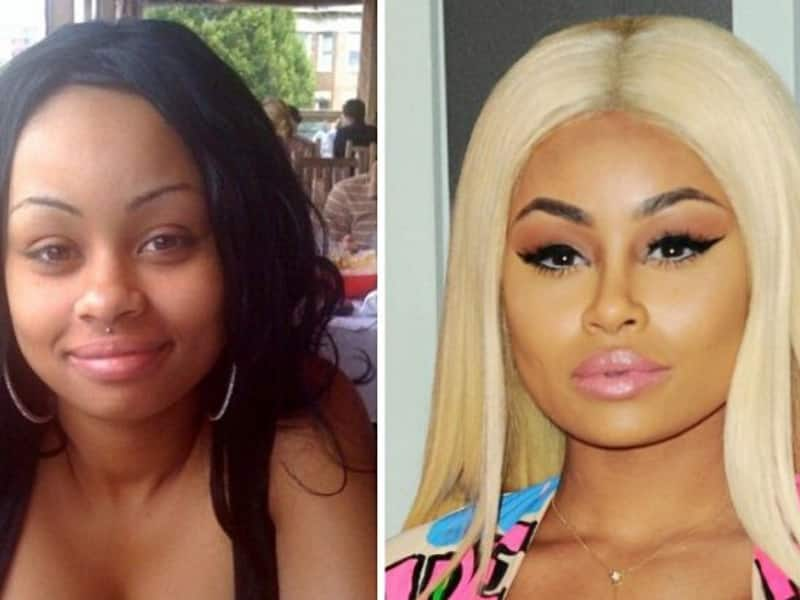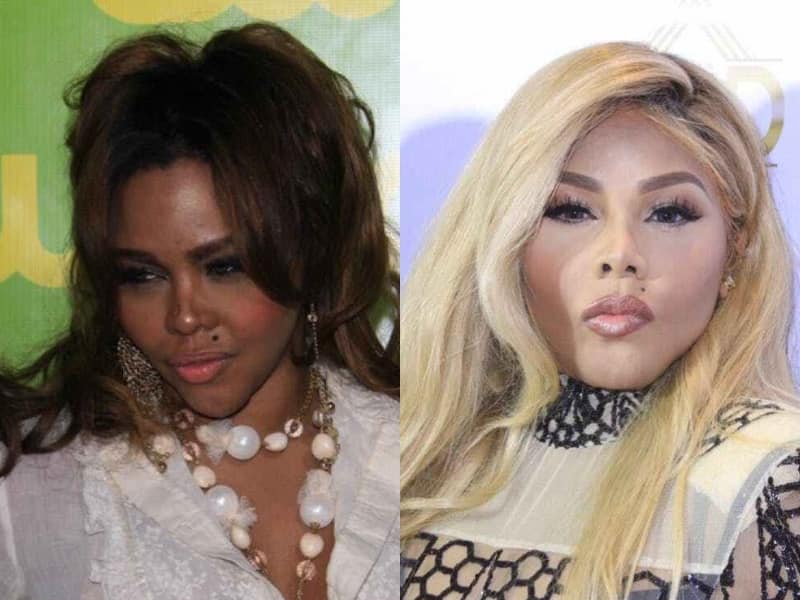Celebrity Skin Bleaching: A Deep Dive Into The Controversial Topic
Is the pursuit of a lighter complexion a personal choice, or a reflection of societal pressures and evolving beauty standards? The trend of skin bleaching among celebrities, particularly within the Black community, has sparked intense debate, revealing a complex interplay of cultural identity, self-perception, and the relentless demands of the entertainment industry.
For Black Americans, the topic of skin color is deeply intertwined with history, identity, and societal perceptions. This complex relationship has, for generations, influenced beauty standards and personal choices. It's within this context that the practice of skin bleaching, or skin lightening, takes on a particularly charged significance. The desire to alter one's skin tone raises questions about self-acceptance, the impact of Eurocentric beauty ideals, and the pressures faced by those in the public eye.
The methods employed in skin lightening are varied and often involve considerable risk. Skin whitening creams, also known as bleaching creams, are widely available, but results can take a long time to manifest. These creams often contain ingredients that can have detrimental effects on the skin, including long-term damage and an increased risk of skin cancer. Chemical peels and chemical serums are also used, and some individuals even resort to surgical procedures. The risks associated with these methods, however, are often overshadowed by the perceived benefits of achieving a lighter complexion.
- August Maturo Mckenna Grace A Look At Their Friendship
- Sammi Sweetheart Christian Biscardi Split What Happened
The entertainment industry, with its emphasis on physical perfection, has played a significant role in the rise of skin lightening. Celebrities, constantly in the public eye, are often under immense pressure to conform to prevailing beauty standards. This pressure can lead to a cycle where individuals feel compelled to alter their appearance to maintain or enhance their careers. The impact extends beyond the individual, influencing societal perceptions of beauty and perpetuating a cycle of self-critique and the pursuit of an unattainable ideal.
The controversy surrounding skin bleaching is compounded by the cultural context. The desire to lighten one's skin has often been linked to historical factors, including the legacy of colonialism and slavery, which prioritized lighter skin tones. This has led to a sense of internal conflict for some individuals who may feel torn between their cultural identity and the pressure to conform to a different standard of beauty. The trend among Black celebrities to alter their skin color has ignited a critical dialogue about beauty ideals, societal norms, and the individual's freedom of choice.
The consequences of skin lightening extend beyond personal choices, impacting society's understanding of beauty. When celebrities, who are often seen as role models, appear with lighter skin tones, it can influence what is considered beautiful by society. This can contribute to the perpetuation of a narrow beauty ideal, one that excludes and devalues individuals with darker complexions. These choices prompt reactions, comments, and discussions about beauty and cultural identity in the modern world.
- Alison Brie Dave Franco A Decade Of Love Collaboration See How
- Sagittarius Tattoos Unique Designs Ideas For 2024
The practice of skin bleaching among celebrities is not a new phenomenon. In recent years, many public figures have been accused of lightening their skin. The reactions to these accusations and the discussion surrounding the matter are revealing.
In 2011, South Africa was abuzz with the news that former Kwaito star Mshoza, whose birth name is Nomasonto Mnisi, had begun skin bleaching treatments. Mshoza admitted to being unhappy with her darker skin, even expressing a desire to resemble the late Michael Jackson, and she later appeared noticeably lighter. Her case highlights the pressures that can lead individuals to seek skin lightening.
Beyonc, who has been in the spotlight for over two decades, is another example of a celebrity who has been the subject of skin lightening speculation. In the 2000s, she was seen in photos with a lighter complexion than usual, which led to rumors and controversy, though she has never publicly admitted to undergoing the procedure. Similarly, other celebrities, such as actress Meagan Good, have found themselves in the crosshairs of intense media scrutiny regarding their appearance. When asked about her changing complexion, Good addressed what she called "nonsense" by stating that she loved her skin and was happy the way she looked.
When it comes to skin bleaching, one of the most talked about cases is that of the late Michael Jackson. The King of Pop's skin tone became progressively lighter over the years. While Jackson stated that his skin condition was vitiligo, a rare disorder that causes loss of skin pigmentation, the change in his appearance sparked speculation and debate that has continued long after his passing. His case is significant because it drew significant attention to the psychological and physical impact of the practice.
Many celebrities have been associated with skin bleaching. The issue is so prevalent that it has led to various media reports that have compiled lists of individuals who have undergone skin lightening. Among the most popular are: Beyonc, Meagan Good, Mshoza, and Michael Jackson. However, it is important to note that for some individuals, the changes in skin tone could be a result of photo editing, lighting, or other conditions. The practice is not limited to any specific group and has been seen in all areas of the entertainment industry.
Whether it's the harsh bleaching creams, chemical peels, or other methods used, the consequences of skin lightening can be serious. While the desired result might be achieved in some cases, the potential for long-term damage to the skin, including a grayish or dull tint, and severe health issues, such as skin cancer, is significant.
When accused of skin bleaching, some celebrities respond by stating their love for their natural skin tone or that they are using products to enhance their skin's health. Their words, however, are not always able to calm the speculation. The public's continued interest in this issue, along with the frequency with which it arises, speaks to the complexity of societal norms, beauty standards, and the pressures faced by celebrities.
Without a doubt, the art of skin bleaching has become extremely popular in recent years, and it has extended into the mainstream with celebrity involvement. This trend forces one to contemplate the ever-changing beauty standards and how they influence individuals and society.
In conclusion, the practice of skin bleaching is a controversial topic, with several celebrities having undergone this practice. It is an intricate web of personal choices, societal expectations, and the pressures of the entertainment industry. Whether it's the harsh bleaching creams, chemical peels, or other methods used, the consequences of skin lightening can be serious. While the desired result might be achieved in some cases, the potential for long-term damage to the skin, including a grayish or dull tint, and severe health issues, such as skin cancer, is significant. As society continues to grapple with these complexities, the ongoing conversation surrounding skin bleaching will likely evolve, reflecting the ever-changing landscape of beauty, identity, and self-expression.
- Albany Ga Obituaries Find Recent Notices Funeral Info Today
- Anna Faris Michael Barrett Secret Wedding New Photos

Celebrities Who Bleached Their Skin Glossyfied

Celebrities Who Bleached Their Skin The Unveiling Of Beauty Standards

Celebrities who bleached their skin before and after photos Tuko.co.ke